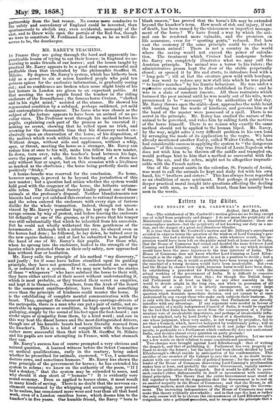stairs In flit filitnr.
THE DEBATE ON MR. CARDWELL'S MOTION.
Belfast, 24th May 18.58.
Sin—The withdrawal of Mr. Cardwell's motion gives me no feeling except one of relief from perplexity and danger : I do not mean the perplexity of a Ministerial crisis or the danger of a dissolution of Parliament : these are commonplace matters—but the perplexity of not knowing our duty as a na- tion, and the danger of a great and disastrous blunder.
It is true that both Mr. Cardwell's motion and Mr. Dillwyn's amendment avoided in express terms the question of the wisdom of Lord Canning's pro- clamation . but had a division taken place, with whatever result, the im- pression would have been left on the public mind both at home and in India, that the House of Commons had raised and decided the issue between Lord Canning and Lord Ellenborough : and it is difficult to say which decision would have been the more injurious to the true interests of India. The House of Commons does not know whether Lord Canning or Lord Ellen- borough is in the right, and therefore is not in a position to decide ; had a decision been forced on, it would as probably have been wrong as right : and the mischief of a wrong decision would have been incalculable. But even had the House by chance been right, immense hannuwould have been done, by establishing a precedent for Parliamentary interference with the actual working of the government of India. It is difficult to conceive anything more dangerous than this ; for though the British Impe- rial Parliament is at least as likely as any other assembly in the world to decide aright in the long run, and when in possession of all the facts of a case, yet it is utterly incompetent, as every large deliberative assembly must ever be, to interfere with advantage in a question which demands immediate decision, and yet cannot be at once understood by any except those who make such subjects their business. It is only with the Imperial relations of India that Parliament can directly interfere with any advantage. If any argument were needed in favour of the necessity of a really independent Council of India, it would be supplied by the fact that India has been saved from the consequences of a Parlia- mentary vote of incalculable importance' and perhaps of incalculable influ- ence for mischief, only by Lord Derby's threat of a dissolution. Can any one whose judgment, whose very sanity, is not warped by prejudice, fail to see that a Council, which, however hampered by traditionary policy, will at least understand the questions submitted to it and judge them on their merits, is preferable to a Parliament which confessedly does not understand India, and decides almost every question on party grounds ?
So much for the bearing of recent events on Indian politica. Let me now say a few words on their relation to some constitutional questions.
Two charges were brought against Lord Ellenborough : that of writing the despatch, and that of publishing it. Parliament has very properly re- fused to decide the fonner ; but the latter had been already decided by Lord Ellenborough's official suicide in anticipation of his condemnation. This sacrifice of one member of the Cabinet to save the rest, is no doubt incon- sistent with our conventional code of political honour ; for the speech of the leader of the House of Commons disavowing Lord Canning's proclamation makes him at least, and probably the entire Government, equally answer- able for the publication of the despatch. But it would be difficult to prove such conduct either dishonourable in itself or inconsistent with constitu- tional principles. The theory that the entire Government must stand or fall together is based on the supposition that the Government is to rest on an assured majority in the House of Commons i and that the House, in all important matters, must choose between obeying or ejecting the Govern- ment. The increasing independence of the House of Commons may soon make this theory evidently unworkable ; and in that ease the beet or rather the only course will be to elevate the circumstances of Lord Ellenborough% resignation into a politiedyeecedent, and to recognise the principle that a
vote of censure is to displace only the Minister whose department is censured. A concluding word about Lord Canning's proclamation. It is utterly ab- surd to say that he intended to confiscate the property of the villagers. But is it not to be feared that it will be so understood in Oude ?



























 Previous page
Previous page